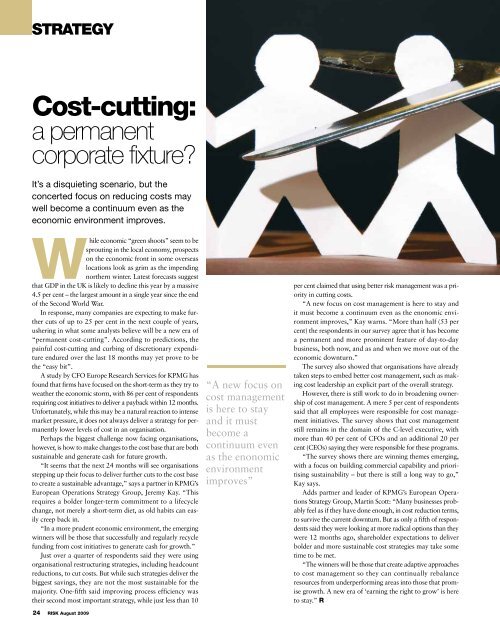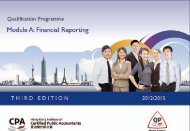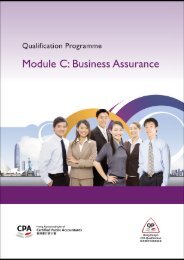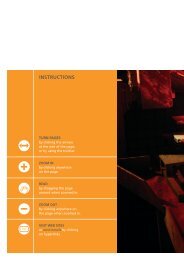MAGAZINE - Realview
MAGAZINE - Realview
MAGAZINE - Realview
Create successful ePaper yourself
Turn your PDF publications into a flip-book with our unique Google optimized e-Paper software.
STRATEGY<br />
Cost-cutting:<br />
a permanent<br />
corporate fixture?<br />
It’s a disquieting scenario, but the<br />
concerted focus on reducing costs may<br />
well become a continuum even as the<br />
economic environment improves.<br />
While economic “green shoots” seem to be<br />
sprouting in the local economy, prospects<br />
on the economic front in some overseas<br />
locations look as grim as the impending<br />
northern winter. Latest forecasts suggest<br />
that GDP in the UK is likely to decline this year by a massive<br />
4.5 per cent – the largest amount in a single year since the end<br />
of the Second World War.<br />
In response, many companies are expecting to make further<br />
cuts of up to 25 per cent in the next couple of years,<br />
ushering in what some analysts believe will be a new era of<br />
“permanent cost-cutting”. According to predictions, the<br />
painful cost-cutting and curbing of discretionary expenditure<br />
endured over the last 18 months may yet prove to be<br />
the “easy bit”.<br />
A study by CFO Europe Research Services for KPMG has<br />
found that firms have focused on the short-term as they try to<br />
weather the economic storm, with 86 per cent of respondents<br />
requiring cost initiatives to deliver a payback within 12 months.<br />
Unfortunately, while this may be a natural reaction to intense<br />
market pressure, it does not always deliver a strategy for permanently<br />
lower levels of cost in an organisation.<br />
Perhaps the biggest challenge now facing organisations,<br />
however, is how to make changes to the cost base that are both<br />
sustainable and generate cash for future growth.<br />
“It seems that the next 24 months will see organisations<br />
stepping up their focus to deliver further cuts to the cost base<br />
to create a sustainable advantage,” says a partner in KPMG’s<br />
European Operations Strategy Group, Jeremy Kay. “This<br />
requires a bolder longer-term commitment to a lifecycle<br />
change, not merely a short-term diet, as old habits can easily<br />
creep back in.<br />
“In a more prudent economic environment, the emerging<br />
winners will be those that successfully and regularly recycle<br />
funding from cost initiatives to generate cash for growth.”<br />
Just over a quarter of respondents said they were using<br />
organisational restructuring strategies, including headcount<br />
reductions, to cut costs. But while such strategies deliver the<br />
biggest savings, they are not the most sustainable for the<br />
majority. One-fifth said improving process efficiency was<br />
their second most important strategy, while just less than 10<br />
24 RISK August 2009<br />
“A new focus on<br />
cost management<br />
is here to stay<br />
and it must<br />
become a<br />
continuum even<br />
as the enonomic<br />
environment<br />
improves”<br />
per cent claimed that using better risk management was a priority<br />
in cutting costs.<br />
“A new focus on cost management is here to stay and<br />
it must become a continuum even as the enonomic environment<br />
improves,” Kay warns. “More than half (53 per<br />
cent) the respondents in our survey agree that it has become<br />
a permanent and more prominent feature of day-to-day<br />
business, both now, and as and when we move out of the<br />
economic downturn.”<br />
The survey also showed that organisations have already<br />
taken steps to embed better cost management, such as making<br />
cost leadership an explicit part of the overall strategy.<br />
However, there is still work to do in broadening ownership<br />
of cost management. A mere 5 per cent of respondents<br />
said that all employees were responsible for cost management<br />
initiatives. The survey shows that cost management<br />
still remains in the domain of the C-level executive, with<br />
more than 40 per cent of CFOs and an additional 20 per<br />
cent (CEOs) saying they were responsible for these programs.<br />
“The survey shows there are winning themes emerging,<br />
with a focus on building commercial capability and prioritising<br />
sustainability – but there is still a long way to go,”<br />
Kay says.<br />
Adds partner and leader of KPMG’s European Operations<br />
Strategy Group, Martin Scott: “Many businesses probably<br />
feel as if they have done enough, in cost reduction terms,<br />
to survive the current downturn. But as only a fifth of respondents<br />
said they were looking at more radical options than they<br />
were 12 months ago, shareholder expectations to deliver<br />
bolder and more sustainable cost strategies may take some<br />
time to be met.<br />
“The winners will be those that create adaptive approaches<br />
to cost management so they can continually rebalance<br />
resources from underperforming areas into those that promise<br />
growth. A new era of ‘earning the right to grow’ is here<br />
to stay.” R

















